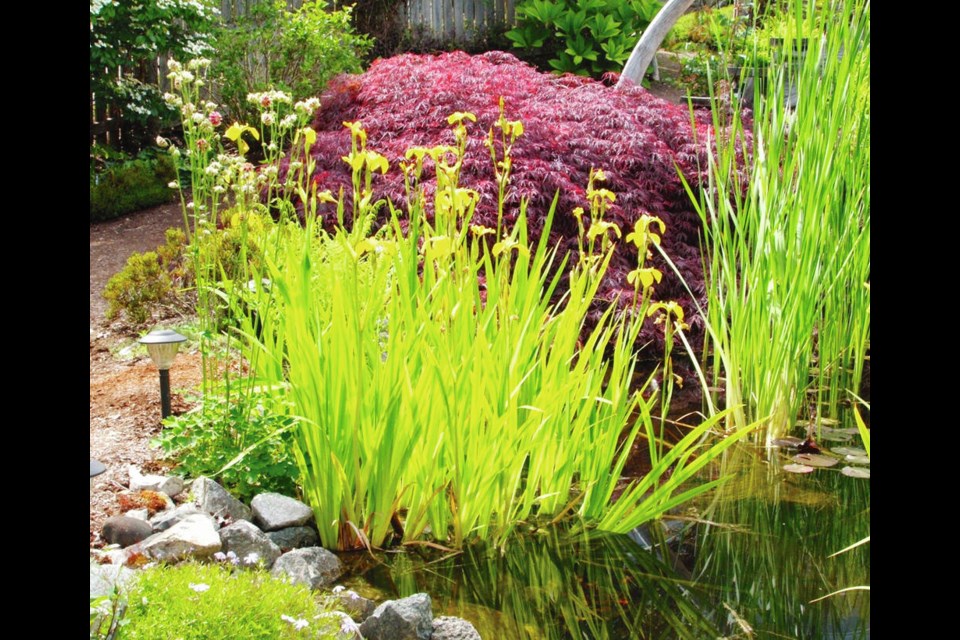Dear Helen: I’ve had the opportunity this summer to wander through a number of gardens. Two of them had water features, with lovely clumps of yellow iris. It seems to me I’d heard something about this iris being invasive. Should I be growing it in a pond I’m developing?
W.F.
According to the Invasive Species Council of B.C., yellow flag iris (Iris pseudacorus) is an ” aggressive invader” that can form dense thickets that displace native species in natural habitats.
The plants spread easily by seed and through underground rhizomes and rhizome fragments.
For ornamental ponds and water gardens, there are other irises that are attractive, non-invasive, and ideal for boggy areas and pond edges. One is Japanese iris (Iris ensata) and its many named varieties. The plants are smaller than I. pseudacorus, at 40 cm. The late spring and early summer flowers are large and beautiful, in mainly blue, purple and white.
Also commonly called Japanese water iris, I. laevigata grows to around 45 cm tall, with large, flattish flowers in typical blue-violet and also white and pink, in mid to late summer.. This is considered an easy-growing, undemanding iris that will grow in 15 cm of water as well as in wet and boggy areas. There are forms with variegated leaves of both I. ensata and I. laevigata.
Dear Helen: Early in the month I began to notice fruit flies in my kitchen. What is the best way of trapping them?
L.G.
Fruit flies usually begin appearing in my kitchen later in the summer. They made an appearance earlier this year, two weeks ago, when I was surprised to see a few of them fly up from the small stainless steel compost container by the kitchen sink.
Apple cider vinegar traps are known to work well. Around a three-cm depth of the vinegar is enough. A drop or two of dish soap added to the vinegar provides enough surface tension to hold onto any flies that light on the surface. I’ve been experimenting with this simple trap — just vinegar and a squirt of dish soap, in a shallow jar left uncovered. I counted 20 flies in the jar after just a few hours.
Or, use just the vinegar and secure plastic wrap over top. A few holes poked in the plastic wrap allows the flies to enter, but they won’t be able to find their way out. Using a glass jar allows you to see whether flies are being trapped.
I’ve noticed that fruit flies are attracted quickly to lemon pieces as well. I use lemons almost daily in cooking and salad making, and always have bits of rind to place in a clear container covered with plastic wrap or some other lid, with small entry holes made in the cover.
Another method I’ve used is to quickly cover the small compost container by the sink with plastic wrap and secure the wrap with an elastic band. This holds the flies prisoner until I take the container outdoors and uncover it to release them. Such “live trapping” appeals to Buddhist friends and others who do not wish to kill any living thing. But it is a bit of a nuisance, having to uncover the container each time there is something to place in it.
When the container is filled with fruit and vegetable cores and peelings, I do not empty it onto a compost heap, where the contents would become an open invitation to rats and flies. Instead, I bury the waste in holes as deep as I can make them, between vegetable rows and along plot edges where the soil dries out quickly. The buried materials break down quickly into a spongy, moisture-retentive mass.
GARDEN EVENT
Secateur sharpening. Russell Nursery, 1370 Wain Rd. in North Saanich, is offering a workshop on sharpening secateurs (hand pruners), with Brian Russell, on Friday, Aug. 19, at 10:30 a.m. and at 1 p.m. Dull secateurs are dreadful to use. Learn how to take them apart, clean, sharpen and put them back together. Bring your secateurs with you for this hands-on workshop. In honour of Russell Nursery’s 30th anniversary, the workshop is free, but register for a place by phoning 250-656-0384 or email [email protected].



